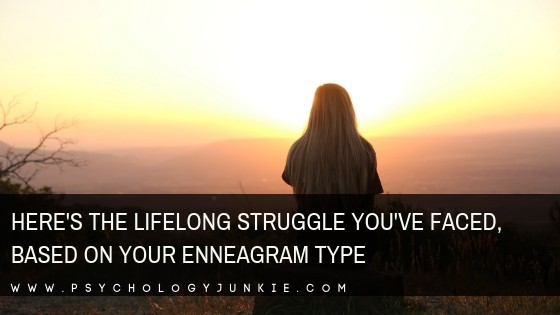Here’s the Lifelong Struggle You’ve Faced, Based on Your Enneagram Type
Have you ever wondered what causes you to have the insecurities and difficulties you face every day? Do you ever feel like your struggles are unrelatable to other people? The enneagram can be a very helpful tool when it comes to understanding your insecurities, fears, and roadblocks. It takes you to the roots of your behaviors and explains why you have the anxieties and temptations you do. This personality system can be a starting place for immense personal growth if it’s used in the right way!
But What IS the Enneagram?

The enneagram is a personality system symbolized by a nine-pointed geometric figure that maps out nine personality types. “Enneagram” is taken from the Greek word “nine”-ennea-and “figure”-grammos; making it a “nine-pointed figure”. According to the theory behind the enneagram, each of us is born with a dominant type (one of the numbers 1-9). These numbers are then connected by arrows in significant patterns which point the way towards health (integration) and neurosis (disintegration). You can find out more about the background of the enneagram and the nine enneagram types here.
Estimated reading time: 14 minutes
Not sure what your enneagram type is? Take our new personality questionnaire here!

Here’s the Lifelong Struggle You’ve Faced, Based on Your Enneagram Type
Type One – An Overwhelming Sense of Responsibility and Perfectionism
As a one, you feel obligated to do the right thing at all times. You monitor your thoughts and feelings, making sure you are always performing (and thinking) at your very best. You worry about being bad, evil, or letting people down. You feel like if only you could work hard enough or be “good enough” that everything in your life would smooth itself out. The only problem is the cycle never ends. In fact, you may start feeling like you need to make up for the carelessness of other people and not only yourself. Your conscience is both your best friend and your harshest critic. In your efforts to be perfect you sometimes find yourself exhausted, drowning in responsibilities, and trying to appear calm under pressure while repressing anger and anxiety.
What to Do About It: Pay attention to your tendency to push yourself beyond your limits. Pay attention to your workload and pause before taking on more responsibilities. If a voice inside you criticizes you for taking a break, don’t own that voice. Remind yourself that that voice isn’t “God”, and it isn’t even you. Give yourself breathers and time for play or relaxation. It might be hard at first, but doing this will point you towards progress, inspiration, and a deeper sense of meaning.
Type Two – An Aching Sense of Worthlessness and a Compulsion to Earn Love through Selflessness
If you are a two, throughout your life you’ve held the belief that you should put others before yourself. While this can be a noble cause, it can also be taken too far. You struggle with the fear that people only love you because of what you do for them. You feel like you have to earn love through selflessness, generosity, and nurturing the needs of everyone else but yourself. Sometimes people call you a people-pleaser or they take you for granted, only to leave you feeling empty and hurt. It can feel nearly impossible for you to acknowledge your own needs. In fact, you feel immense guilt and even insecurity when you ask for help or have to say no to a request. You worry about whether the people in your life love you or just what you do for them. Sometimes it’s just all too exhausting to handle.
What to Do about It: Reflect on the fact that no matter what you do in life, there is no pleasing everyone. Remind yourself that it’s okay if some people aren’t your friend. Keep in mind that not everyone will be as effusive with their feelings as you are. Look for other ways (actions, commitments) that they might be showing they care. Most of all, learn to set healthy boundaries. Pause and think about your interests and needs. Are they being met? Have you over-committed yourself? Remind yourself that you don’t have to take care of everyone else’s needs. Some people need to be able to solve their own problems.
Type Three – A Need to Gain Status Because You Fear That Maybe You Have No Inherent Worth
Threes are people of ambition and achievement. If you identify with this type then you probably strive for success in everything that you do. You want to make a good impression, achieve goals, and show up in the best possible light. The only problem with this is that underneath all the achievements and appearances you struggle with a nagging fear that without accomplishments and obvious success you’re not worth anything. All the validation in the world feels unsatisfying because you are usually praised for what you do and not who you are. You feel like you can never accomplish enough or achieve enough. No matter how hard you work there is always a higher goal to reach. This can lead to physical exhaustion, burnout, jealousy, or anger.
What to Do about It: Give yourself regular breaks. Take daily pauses to focus on your breathing and check in with yourself. Are you feeling tired? Angry? Sad? Enthusiastic? Think of things you can do for yourself to improve your physical or emotional well-being. Take a nap or talk to a trusted friend. It’s also important to find people that you can trust so that you can be vulnerable and open with them. Don’t worry about appearing on top of things all the time. Find someone you can be genuine with. Having a trustworthy friend can help you to feel loved for who you are and not just what you do.
Type Four – A Nagging Sense of Being Misunderstood, Insignificant, or Disconnected from Yourself
Fours venture through life feeling fundamentally different from the people that surround them. If you identify with this type then you probably felt misunderstood or alien in your own family as a child. You are acutely aware of your own deficiencies and differences, and as a way of coping with this you have tried to create an identity out of your inner experience and what makes you unique. The only problem is that you struggle with understanding who you really are. The more you seek a unique identity the more it can feel out of your grasp. You often feel melancholy, lonely, or envious of others who seem to gracefully meander through life with acceptance and understanding. You secretly wish that you could enjoy the easiness and security that others seem to enjoy. On your worst days you feel alienated, hopeless, melancholy, and filled with self-hatred.
What to Do about It: Remember that your feelings may be lying to you sometimes. When you find yourself feeling hopeless and unloved try to pause and look at the facts. Who loves you? Who can you trust? What is stable and dependable in your life? What experiences bring you joy? Seek out friends who will be compassionate with you, but also direct and let you know what’s real. Set up consistent, healthy routines in your life. It can be easy to forget about your physical and social needs when your inner world feels so overwhelming. Set reminders on your phone to drink enough water, go to sleep at a decent time, or go outside and spend time in nature with a friend you enjoy.
Type Five – A Fear of Being Overwhelmed or Helpless which Leads to an Endless Search for Knowledge
You have a relentless need to pursue knowledge, and not just any knowledge; something specialized and unusual. You feel like if you are able to learn enough then you can handle life and survive. The more knowledge you have in a niche category the more you feel you can gain independence and confidence. The only problem is that no matter how much knowledge you get you worry that you still aren’t prepared enough to take your place in the world. You might shut out other people or isolate yourself so that they won’t overwhelm you or drain you of your energy. You retreat into your mind so that you can feel safe and view things objectively. You tend to cut yourself off from your emotional needs and hoard knowledge and personal space. This can lead to physical neglect of yourself, eccentricity, distorted perceptions, and increasing isolation.
What to Do about It: Practice being present in the moment. Look around yourself and notice the details in your vicinity. Reconnect with the world through physical activity. Do yoga, martial arts, or just take a walk. Awaken your body and you will find that your mind is sharper and you are less plagued by uncertainty. Make the effort to spend time with the people who care about you. It’s easy for you to not expect anything from anyone, but there may be people who really want to support you and show you love. Practice stating your needs and expressing your thoughts. Connect with your feelings in a safe place or with someone you trust.
Type Six – Relentless Anxiety about Abandonment and Worst-Case Scenarios
Sixes have a strong desire for security alongside an equally strong suspicion of authority and institutions. If you identify as a six you are deeply loyal and protective of your loved ones, but you also feel uncertain about their support and welfare. You worry about being left alone or without the resources to handle life. You struggle with confidence in your own judgments so you look for answers in books, science, religion, job security, or any other number of resources. You may feel an incessant urge to work so that you can provide security for yourself or your family. No matter how much you look for answers and security it always seems beyond your grasp. You feel that you’re constantly struggling to find firm ground or something or someone you can rely on. You’re filled with a nameless anxiety and easily imagine worst-case scenarios unfolding in the future. On your worst days you feel intense fear, depression, and worry.
What to Do about It: As soon as you experience a moment of calm, your mind tends to instantly latch onto your next horrifying worry. The next time you have a moment of peace or accomplishment, pause, relax, and breathe. Take a mental snapshot of this moment and refuse to let your mind wander to all that could go wrong. Think of who and what you can trust. Connect with something in your environment that calms you, whether it’s a song, a poem, a person you love, or a part of nature. Take frequent breathers throughout the week to enjoy peace and quiet and beauty. Spending time in soothing, peaceful surroundings can help you to feel more at ease and less overwhelmed with the darkness and negative possibilities in the world.
Type Seven – An Anxious Feeling That the Grass is Always Greener on the Other Side
Sevens are focused on the world of possibilities and adventure. They love imagining all the experiences they could enjoy or all the future opportunities they could take advantage of. If you identify as a seven then you struggle with a persistent fear that you are missing out or limited. You hate the idea of being trapped or unable to explore more options. Boredom is your arch nemesis, and you easily become impatient and restless when life doesn’t give you variety and stimulation. You try to stay as busy as possible, juggling many different ideas, experiences, and plans in an attempt to dissuade your anxiety. What you may not realize is that in your efforts to constantly experience more you are ignoring pain or insecurities that nestle deep within your soul. The more distracted you become the more you feel like you can ignore negative feelings or monotony. On the outside you appear optimistic and enthusiastic, and indeed, this is how you want to feel on the inside. But the minute you start to feel boredom your anxiety emerges. In your efforts to distract yourself you may become unfocused, selfish, and/or addicted to instant gratification.
What to Do about It: Practice completing ordinary activities. Bring your attention to the task you have started and notice when your attention wanders. Keep guiding your attention back to the task at hand no matter how difficult it feels. As you do this you’ll notice uncomfortable feelings start to emerge. Some may be physical (tiredness, hunger, thirst) while others might be emotional. These “triggers” might tempt you to change your activity so that you don’t have to concentrate on them or deal with them. Write down the emotions and discomforts that emerge. After you’ve finished your task think about how you can deal with them. Do you need to rest? Should you talk to someone about the uncomfortable emotions? It’s easier to stay busy, but true healing involves finishing tasks you start and taking the time to tune into who you really are and what you really feel. Meditation can also be a helpful practice.
Type Eight – Constantly Having to Push Against the World to Have Independence, but Missing Out on Good Things in the Process
Eights want to feel solid and impenetrable. They crave freedom over their own lives and they often feel that they can’t look to others for support. If you identify as an eight you probably felt that you were pushed to grow up quickly. You didn’t feel safe being “soft” or vulnerable in any way as a child. To deal with this you developed a tough, resourceful attitude towards life. You can handle a great deal of physical pain without complaining, but you deeply fear being emotionally hurt, rejected, or controlled. Beneath your tough outer layer is someone who needs emotional affirmation and love. You simultaneously want to let people into your life, but that means being vulnerable – a position you never want to be in. Because you’re so focused on being impervious to pain and independent you might push people away before they have a chance to hurt you. On your worst days you become competitive, guarded, vengeful, and bitter.
What to Do about It: It will feel silly to you, but it’s important to get in touch with your feelings. The more you focus on guarding yourself and pushing against the world, the less you may actually realize the emotions that are underlying your behaviors. If you have someone you can trust, practice opening up to them about your feelings, grievances, and struggles. Don’t assume that other people don’t want to hear these things. Appreciate it when other people listen accept you where you are. Store that feeling away when you feel tempted to block people out. Also try to avoid workaholism. Working is an important part of life, but you also need moderation, rest, and restoration. Spend quiet time in nature or in prayer or restful play.
Type Nine – Tuning Out of Your Own Inner Feelings and Instincts to Cope with the Fear of Loss or Conflict
Nines believe in maintaining internal as well as external peace. They work to maintain harmony not only outside themselves, but inside. They look at the bright side of life and are usually easy-going and in tune with the spiritual world. If you identify as a nine you tend to struggle with saying what you want or standing up for yourself because you don’t want to “rock the boat”. You may find that you disappear into the background when tensions in your environment arise. Either you become the peacemaker or you make yourself scarce so as to avoid disrupting your inner harmony. You might be tempted to go along with other people instead of stating your disagreements. It can feel like arguments aren’t worth having or that your inner anxieties and issues aren’t worth dealing with or mentioning. Unfortunately, this can lead to a feeling of inner loss or confusion about who you really are as a person. You may also find yourself not getting your needs met because you’re so determined not to make a fuss. You might avoid confronting your problems for so long that they sneak up on you and become worse than ever. You also might suppress your anger for long periods of time only to have it bubble up later and pour out into a fit of rage.
What to Do about It: Remember that while humility is a good thing, it’s also not wise to discount your needs and abilities. Practice saying “no” when you don’t want to do something. Always agreeing to what other people want might feel easier in the short term, but it can result in passive-aggressiveness, frustration, and resentment on your part. Take some time each day in the morning to determine what you want to get out of your day. Remind yourself that you are allowed to have desires and to take time to meet your needs. Take time to develop your own unique hobbies and talents. Don’t let yourself disappear into someone else’s life.
What Are Your Thoughts?
Was this article helpful? Would you like to learn more about the enneagram. My favorite resource is the book, The Wisdom of the Enneagram by Don Richard Riso and Russ Hudson.
This article contains affiliate links. I only recommend products I truly believe in.
Find out more about the enneagram:
Here’s What You Desire, Based On Your Enneagram Type
Here’s What You Fear, Based On Your Enneagram Type














I love how a summary of the Enneagram types by “your lifelong” struggle adds greater nuance and depth to my understanding of this amazing tool. Thank you for this article!
When I read the article about the Enneagram six. I started tearing up. It was the first time I’ve felt understood. Thank you so much for this knowledge. I really appreciate it.
I’m 4w5, but could better relate to the struggles of 6, or even 7. I thought 4s have the sense of unique identity which causes us feelings of loneliness and separation and we do not seek ways of self definition as different from others. As for me, I’ve been forever looking for connectedness and belonging. I do value uniqueness, not just in myself but of everyone as diversity is what makes the world go round.
Your information and comments are spot on! I can totally agree with Mandy about finally getting that feeling of being understood, especially because I am a NINE. It is hard for me to express myself and your posts have really helped me to understand myself better so that I can help others understand me better too. Keep up the amazing (life-changing) work!